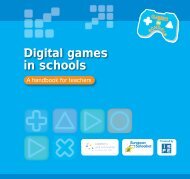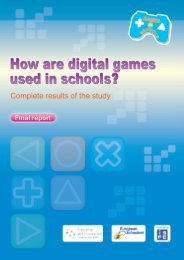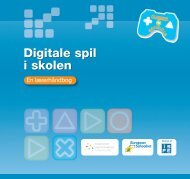Quels usages pour les jeux électroniques en classe ? - Games in ...
Quels usages pour les jeux électroniques en classe ? - Games in ...
Quels usages pour les jeux électroniques en classe ? - Games in ...
Create successful ePaper yourself
Turn your PDF publications into a flip-book with our unique Google optimized e-Paper software.
Korczyn, A. D., Peretz, C., Aharonson, V., & Giladi, N. (2007). Computer based cognitive tra<strong>in</strong><strong>in</strong>g with m<strong>in</strong>dfit<br />
improved cognitive performances above the effect of classic video games; prospective,<br />
randomized, double-bl<strong>in</strong>d <strong>in</strong>terv<strong>en</strong>tion study <strong>in</strong> the elderly. Paper pres<strong>en</strong>ted at the 8th<br />
International Confer<strong>en</strong>ce AD/PD 2007, Salzburg, Austria.<br />
L<strong>en</strong>non, J.L., & Coombs, D.W. (2006), Child-<strong>in</strong>v<strong>en</strong>ted health education games: A case study for d<strong>en</strong>gue<br />
fever. Simulation & Gam<strong>in</strong>g. An Interdiscipl<strong>in</strong>ary Journal of Theory, Practice and Research.<br />
37(1), 88-97<br />
Levy, F., & Murnane, R. (2004). The New Division of Labor: How Computers are Creat<strong>in</strong>g the Next Job<br />
Market. Pr<strong>in</strong>ceton, NJ: Pr<strong>in</strong>ceton University Press.<br />
L<strong>in</strong>ser, R. (2008) The Magic Circle – Game Design Pr<strong>in</strong>cip<strong>les</strong> and Onl<strong>in</strong>e Role-Play Simulations.<br />
Proceed<strong>in</strong>gs of World Confer<strong>en</strong>ce on Educational Multimedia, Hypermedia and<br />
telecommunications 2008 Vi<strong>en</strong>na, Austria, 2008, pp. 5290-97.<br />
Noble, A., Best, D., Sidwell, C., & Strang, J. (2000). Is an arcade-style computer game an effective medium<br />
for provid<strong>in</strong>g drug education to school childr<strong>en</strong>? Education for Health, 13(3), 404-06.<br />
Nova, N. (2001). Awar<strong>en</strong>ess tools: Lessons from quake-like. Paper pres<strong>en</strong>ted at the Play<strong>in</strong>g with the Future<br />
Confer<strong>en</strong>ce, Manchester, UK.<br />
McMahan, A. (2003). Immersion, <strong>en</strong>gagem<strong>en</strong>t, and pres<strong>en</strong>ce: A method for analyz<strong>in</strong>g 3-d video games. In<br />
M. J. P. Wolf & B. Perron (Eds.), The video game theory reader (pp. 67-86). New York:<br />
Routledge.<br />
Magnuss<strong>en</strong>, R. (2007). Teacher ro<strong>les</strong> <strong>in</strong> learn<strong>in</strong>g games - Wh<strong>en</strong> games become situated <strong>in</strong> schools. Digital<br />
<strong>Games</strong> Research Association 2007 Confer<strong>en</strong>ce: Situated Play, Tokyo, 610-15.<br />
Malone, T. W. (1981). What makes video games fun? Byte, 6(12), 258-77.<br />
Malone, T. W., & Lepper, M. R. (1987). Aptitude, learn<strong>in</strong>g and <strong>in</strong>struction iii: Cognitive and affective process<br />
analysis. Hillsdale, NJ: Lawr<strong>en</strong>ce Erlbaum Associates.<br />
Mas<strong>en</strong>dorf, F. (1995). Tra<strong>in</strong><strong>in</strong>g learn<strong>in</strong>g-disabled childr<strong>en</strong>'s spatial ability by computer games. European<br />
Education, Summer 27(2), 49.<br />
Mayer, I. & Bekebreda, G. (2006). Serious games and simulation based e-learn<strong>in</strong>g for <strong>in</strong>frastructure<br />
managem<strong>en</strong>t. In M. Pivec (Ed.), Affective and emotional aspects of human-computer <strong>in</strong>teraction:<br />
Emphasis on game-based and <strong>in</strong>novative learn<strong>in</strong>g approaches. Amsterdam: IOS Press BV.<br />
M<strong>en</strong>n, D. (1993) Multimedia <strong>in</strong> Education: Arm<strong>in</strong>g Our Kids for the Future. PC World 11 (October, 1993).<br />
McK<strong>en</strong>zie, J. (2007). Digital Nativism Digital Delusions and Digital Deprivation. The Education Technology<br />
Journal, 17(2).<br />
McMull<strong>en</strong>, D. (1987). Drills vs. <strong>Games</strong> - Any Differ<strong>en</strong>ces? A Pilot Study. (ERIC Docum<strong>en</strong>t Reproduction<br />
Service No. ED #335355.)<br />
Mitgutsch, K. (2007). Digital play-based learn<strong>in</strong>g; A philosophical-pedagogical perspective on learn<strong>in</strong>g anew.<br />
Paper pres<strong>en</strong>ted at the <strong>Games</strong> <strong>in</strong> Action Confer<strong>en</strong>ce, Goth<strong>en</strong>burg, Swed<strong>en</strong>.<br />
Mitra, S. & Rana, V. (2001) Childr<strong>en</strong> and the Internet: Experim<strong>en</strong>ts with m<strong>in</strong>imally <strong>in</strong>vasive education <strong>in</strong> India.<br />
The British Journal of Educational Technology, 32(2), 221-32.<br />
Moore, B. D. (2005). Neurocognitive outcomes <strong>in</strong> survivors of childhood cancer. Journal of Pediatric<br />
Psychology, 30(1), 51-63.<br />
158






